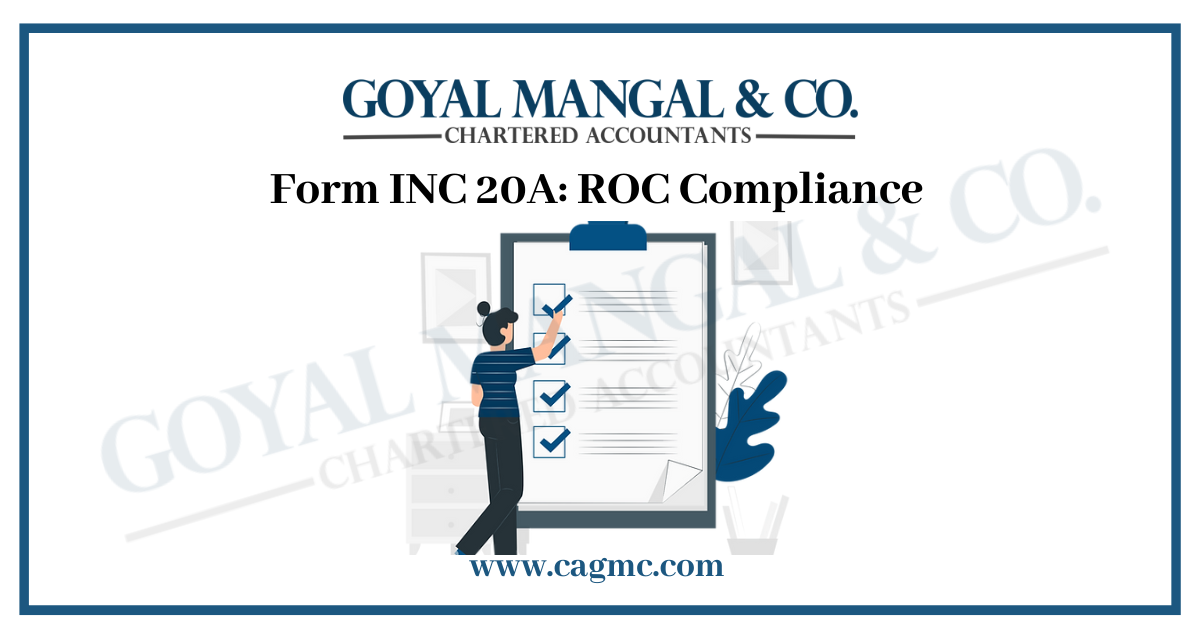 The Companies Act, 2013 mandates the filing of a declaration in Form No INC-20A with additional details regarding Bank statements and Registered address when a newly registered company wants to commence its business and operations in the desired manner. Requisite complying with the provisions is mandatory to exercise its borrowing powers. Several pieces of information are required to be recorded prior to it. Bank statement records are required for the verification of capital deposits by the shareholders of the Company and the Registered Address verifies the place of functioning of the Business.
The Companies Act, 2013 mandates the filing of a declaration in Form No INC-20A with additional details regarding Bank statements and Registered address when a newly registered company wants to commence its business and operations in the desired manner. Requisite complying with the provisions is mandatory to exercise its borrowing powers. Several pieces of information are required to be recorded prior to it. Bank statement records are required for the verification of capital deposits by the shareholders of the Company and the Registered Address verifies the place of functioning of the Business.
The newly Registered Company has to also deposit the entire subscribed share capital in its bank accounts as the Memorandum of Association (MOA) of the company represents before filing for the declaration in Form INC-20A.
Abstract
The approval of the Form of INC-20A is required for a newly registered company to commence the functions of the business and to activate the powers of borrowing. The Form of INC-20A is required to be filed as Section 10A (1) (a) of the Companies Act, 2013 and Rule 23A of the Companies (Incorporation) Rules, 2014 mandate. The mentioned section 10A(1)(a) and Rule 23A are substantial and guide to direct for the procedural following of complying with Form 20A.
From the date of the incorporation of the Company, 180 days are provided as the prescribed maximum time for the filing of Form INC-20A. This also consists of several penalty provisions in case of non-complying with the provision, for which cost as punishment can be levied. However, the provisions of penalty do not restrict to cost but can extend to the closure of the company if the declaration is not filed within the required notions.
Meaning of Form INC 20A
Section 10A (1) (a) of the Companies Act, 2013 introduces the form of INC-20A. It is a prescribed E-Form that is filed by a newly registered company as a declaration before proceeding with the commencement of the business and operations of the company. This form was notified on 25th January 2019 with the purpose of “Prior declaration to the commencement of business and activate powers of borrowing for the company”.
It is to be noted that this provision has a retrospective effect which makes it applicable to all the companies which have been incorporated on or after the 2nd of November 2018.
The Companies (Amendment) Bill, 2019
Section 10A of the Companies Act, 2013 was inserted by the amendment of 2019, naming ‘The Companies (Amendment) Bill, 2019’. This Bill was passed with the purpose to ensure accountable enforcement of norms, management of due compliance in the corporate sector, and for strengthening corporate governance features. This bill comprised various new insertions with amendments, amongst which Section 10A was one of the recent additions which prescribe that now every company will require a declaration by filing an e-Form ‘INC 20A’ with the Registrar of Companies.
Section 10A of the Companies Act, 2013
The Companies (Amendment) Bill, 2019 introduced Section 10A in the Companies Act, 2013 which mandates the filing of e-Form INC 20A with the Registrar of Companies. The section reads as follows;
A Company shall not exercise any borrowing powers or commence any business unless;
- The director of the company within a period of one hundred and eighty days from the date of incorporation of the company files for a declaration in the e-form INC 20A with the Registrar of the companies in respect of the payment of the value of the shares agreed on by every subscriber in the memorandum; and
- That the company has filed with the Registrar a verification of its registered office as provided in subsection (2) of section 12.
Summary of Section 10A of Companies Act, 2013
Section 10A was inserted with the purpose to imply an obligation on part of the directors of the concerned company to file for a declaration after its incorporation within the next 180 days from the date of incorporation. This provision mandates two essential requisites before a newly registered company can commence its business and exercise its borrowing powers without any restrictions, which are as follows;
Registered office– All the necessary returns of the registered office of the company/entity shall be duly filed with the registrar for its verification.
Bank statements– Every subscriber of the Memorandum of Association (MOA) shall pay/submit the number of shares as agreed for.
However, this provision only applies to the following conditions;
- Post incorporation of the company,
- When Company incorporated after the commencement of the mentioned ordinance,
- The company must have a share capital
Section 10A of the Companies Act, 2013 is a reassertion of the provisions under Section 149 of the mentioned Act. However, the applicability of the law under Section 149 was only restricted to public companies. The latest amendments have put an obligation over every company with share capital and which are incorporated after the commencement of the ordinance.
To commence its businesses or exercise its borrowing powers only when the directors of the company file a declaration within 180 days from the date of incorporation of the company. It shall be filed in a prescribed format and requires that every subscriber of the MOA pays the value of the shares that are agreed for. Additionally, the registered office of the company shall be verified by filing all the required returns with the Registrar.
Requirement of Form INC 20A
The provision envisaged under section 10(1) (a) mandates the filing of the form of INC 20A for declaration before the commencement of a business. Before filing this form an entity cannot start its business activities which include the powers of borrowing.
Complying with the provisions not only serves as a declaration norm before the commencement of business but also leads to a heavy penalty in case of non-filing. To save a company from getting struck off, it is important to comply with the provisions otherwise the Registrar of companies may opt for the closure of the company which will lead to loss to the directors.
Important Features
The insertion of Section 10(1) (a) of the Companies Act 2013 provides immersion in some essential features which can be extracted and understood in the following manner;
- Applicability– Ministry of Corporate Affairs notified the provision with retrospective effect. The notification came on the 26th of January 2019 with an effect on all companies incorporated on or after 2nd November 2018. Every newly registered company after the 2nd of November 2018 will be under the applicability of duly following the steps to file INC-20A.
- The company shall not initiate any transaction in the name of the business or any business activity before receiving the approval under the Form of INC-20A. In other words, any purchase, sale, or agreement without the issue of the certificate for the commencement of business shall be concluded as operating illegal activity.
- Capital Deposit– The share capital amount shall be deposited in the bank account of the company through Banking Channel. The transfer of transactions in aggregate should exactly match the paid-up capital by the shareholders.
- Registered Address verification- The company must cross-verify whether its registered address has been reported to the Registrar of Companies at the time of the incorporation of the company or not. Further to which INC-20A with DSC shall be filed.
Documents required for filing of Form INC 20A
For the filing of form INC 20A, there are some required documents which will be required such as statements of records of the concerned bank account where the capital is deposited and certification of professional, etc. However, close to the exhaustive list of documents that will be required in the process of filing form INC 20A are as follows;
- Digital Signature Of One Director (DSC),
- Cross verification of Registered Address,
- Payment of prescribed government fees (in accordance with INC-20A),
- Clarification of no transaction in Bank except Capital deposit by shareholders,
- Professional certificate issued by CA/CS/CMA’
- Bank statements reflecting the entire capital of the company,
- Clarification against non-operative business and no invoices must be generated
Consequences of Non-filing (Penalty Provisions)
Non-compliance with the procedure hold potential to seriously affect the company and its existence. The penalty as is envisaged in the act can be observed as follows;
- Fine Involved: In case of any default in complying with the provisions of the Section, the company will be a liability to be penalized with a sum of 50,000/- Rs.
Every officer who is in default will be liable to be exposed to a penalty of 1000/- Rs. for each day till which such default continues to exist but not exceeding an amount of 1,00,000/- Rs.
- Other Penalties: If the declaration is not duly filed, the company shall be liable to be punished for its closure by the Registrar of the Companies. As failure to comply with the concerned provision provides an additional ground to strike off the company’s name by the Registrar of the Companies.
Can the Form of INC-20A be filed even after the deadline of 180 Days is missed?
The answer is, yes. The form of INC-20A can be filed even after the due date. However, to file after the due date of 180 days, an additional fee will be levied as a penalty based on the delay as per the number of days from the due date of filing. Additional fees will be imposed in the following manner;
- 2 times regular fees: When delayed for more than 30 days
- 4 times regular fees: When delayed for more than 30 days and continues up to 60 days
- 6 times regular fees: When delayed for more than 60 days and continues up to 90 days
- 10 times of regular fees: When delayed for more than 90 days and continues up to 180 days
- 12 times regular fees: When delayed for more than 180 days
Conclusion
Hence, a newly registered company can commence and function in its business only when a form of INC-20A filed by the company’s director is approved. For the filing of the form in the nature of declaration, the maximum time prescribed is 180 days from the date of incorporation of the company. Noteworthy, if the declaratory provisions are not complied with, the company will be liable to be struck off.


